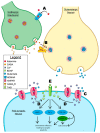Ketamine and the Disinhibition Hypothesis: Neurotrophic Factor-Mediated Treatment of Depression
- PMID: 37242525
- PMCID: PMC10221455
- DOI: 10.3390/ph16050742
Ketamine and the Disinhibition Hypothesis: Neurotrophic Factor-Mediated Treatment of Depression
Abstract
Ketamine is a promising alternative to traditional pharmacotherapies for major depressive disorder, treatment-resistant depression, and other psychiatric conditions that heavily contribute to the global disease burden. In contrast to the current standard of care medications for these disorders, ketamine offers rapid onset, enduring clinical efficacy, and unique therapeutic potential for use in acute, psychiatric emergencies. This narrative presents an alternative framework for understanding depression, as mounting evidence supports a neuronal atrophy and synaptic disconnection theory, rather than the prevailing monoamine depletion hypothesis. In this context, we describe ketamine, its enantiomers, and various metabolites in a range of mechanistic actions through multiple converging pathways, including N-methyl-D-aspartate receptor (NMDAR) inhibition and the enhancement of glutamatergic signaling. We describe the disinhibition hypothesis, which posits that ketamine's pharmacological action ultimately results in excitatory cortical disinhibition, causing the release of neurotrophic factors, the most important of which is brain-derived neurotrophic factor (BDNF). BDNF-mediated signaling along with vascular endothelial growth factor (VEGF) and insulin-like growth factor 1 (IGF-1) subsequently give rise to the repair of neuro-structural abnormalities in patients with depressive disorders. Ketamine's efficacious amelioration of treatment-resistant depression is revolutionizing psychiatric treatment and opening up fresh vistas for understanding the underlying causes of mental illness.
Keywords: arketamine; brain-derived growth factor; esketamine; ketamine; major depressive disorder; synaptogenesis; treatment-resistant depression.
Conflict of interest statement
The authors declare that they have no conflict of interest.
Figures


References
-
- World Health Organization Depression. [(accessed on 6 March 2023)]. Available online: https://www.who.int/news-room/fact-sheets/detail/depression.
-
- National Institute of Mental Health Major Depression. [(accessed on 5 March 2023)]; Available online: https://www.nimh.nih.gov/health/statistics/major-depression.
-
- American Psychiatric Association . Diagnostic and Statistical Manual of Mental Disorders. American Psychiatric Association Publishing; Washington DC, USA: 2022.
-
- Angst J., Angst F., Stassen H.H. Suicide Risk in Patients with Major Depressive Disorder. J. Clin. Psychiatry. 1999;60((Suppl. S2)):57–62; discussion 75–76, 113–116. - PubMed
Publication types
LinkOut - more resources
Full Text Sources
Miscellaneous

